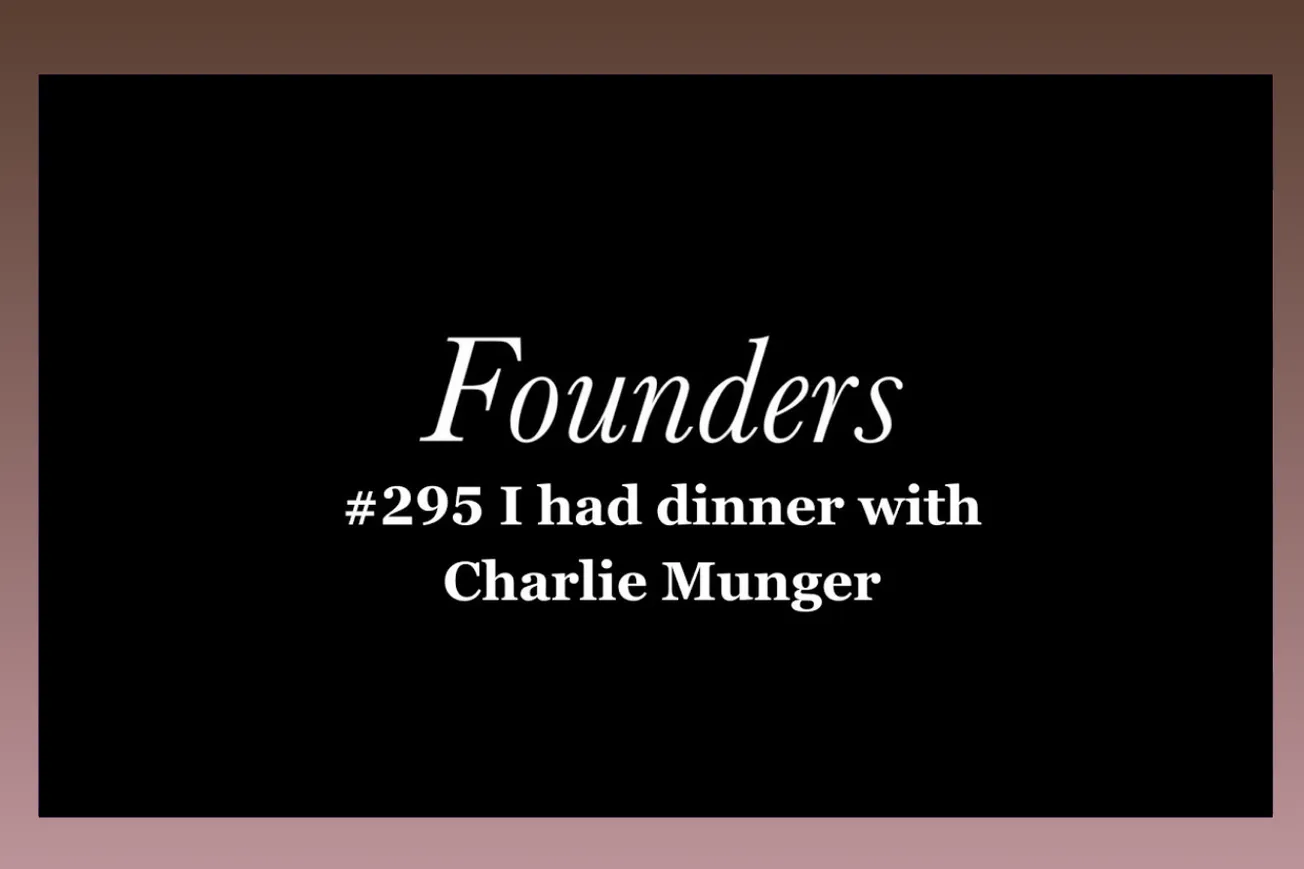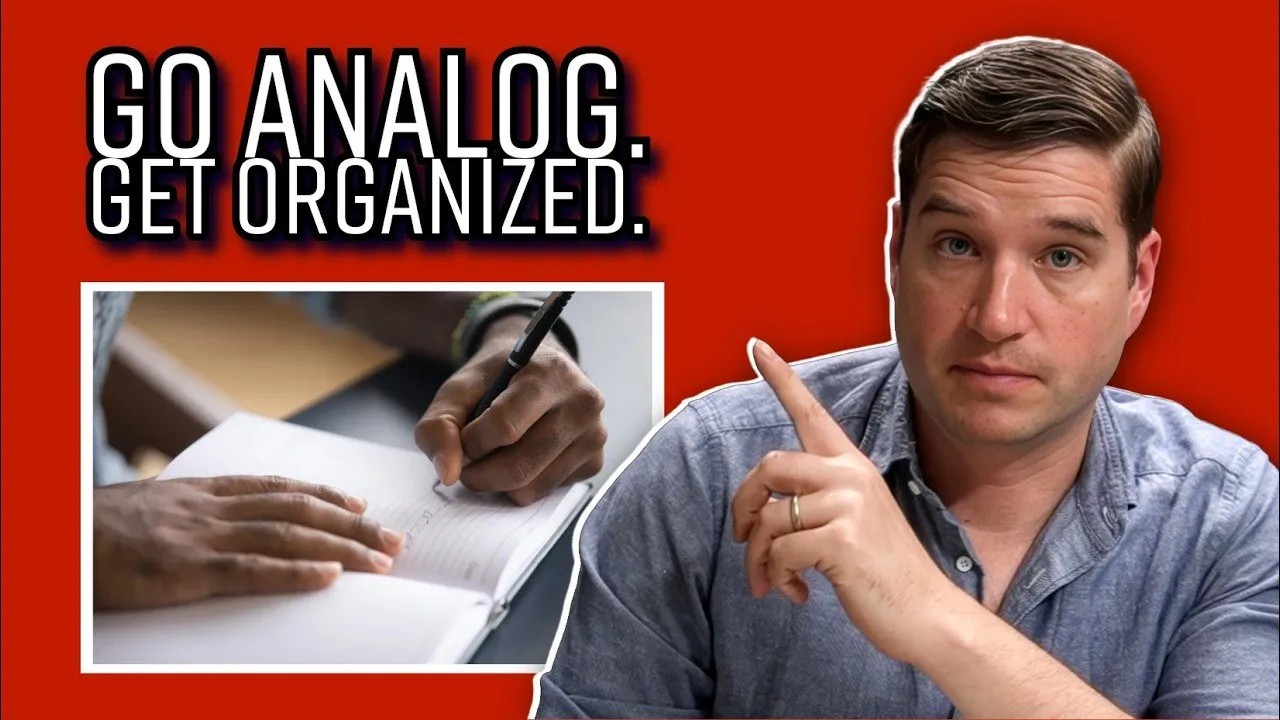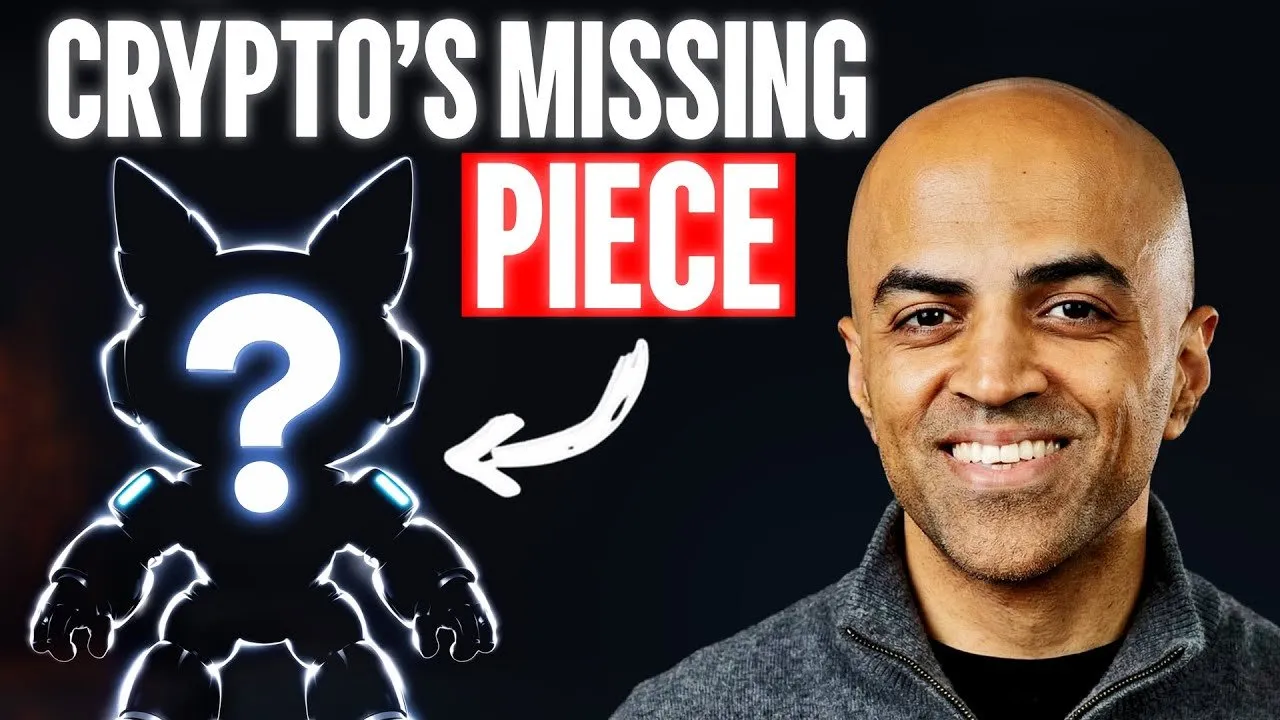Table of Contents
A rare firsthand account of dining with 99-year-old Charlie Munger reveals the mental models that built one of history's greatest investment partnerships.
Key Takeaways
- Great businesses and great people produce fewer problems - aim for quality in everything you surround yourself with
- Wisdom is prevention - avoid problems rather than trying to solve them after they occur
- Stop multitasking immediately - people who focus have enormous advantages over those who scatter their attention
- Learning machines outperform naturally intelligent people who stop growing after formal education ends
- Patience creates wealth - waiting decades for the right opportunities beats constant activity and trading
- Specialization provides protection from competition through barriers to entry that generalists cannot overcome
- Read voraciously across disciplines - Charlie and Warren read more business biographies than most people imagine possible
- Move fast when opportunities arise - having cash and decision-making speed creates massive competitive advantages
Timeline Overview
- 00:00–18:30 — Meeting a Hero: The overwhelming experience of spending three hours with Charlie Munger, seeing his library, and learning that dedication to reading biographies can lead to meeting your heroes in person
- 18:30–35:20 — Early Life and Partnership Formation: Charlie's upbringing in Omaha, working at Warren's grandfather's grocery store, military service learning probability through poker, and the fateful 1959 lunch meeting that began their legendary partnership
- 35:20–52:45 — Investment Philosophy Evolution: From Ben Graham's "fair businesses at wonderful prices" to Charlie's blueprint of "wonderful businesses at fair prices," including the Blue Chip Stamps discovery and focus on float-generating businesses
- 52:45–01:08:15 — Quality Over Quantity Principles: Charlie's complete indifference to problems, the importance of surrounding yourself with great people and businesses, and why diversification worship is counterproductive for wealth building
- 01:08:15–01:24:30 — Learning Machine Mentality: The compounding effect of knowledge, Charlie's habit of reading everything, specialization as competitive protection, and why multitasking destroys deep thinking capacity
- 01:24:30–01:40:45 — Practical Business Applications: Real examples from Costco, Geico, and Nebraska Furniture Mart showing how extreme focus on one variable creates sustainable competitive advantages
- 01:40:45–01:55:20 — Character and Temperament: Charlie's inner clock driving internal motivation, the seamless web of deserved trust, learning from mistakes without self-pity, and building relationships with eminent people
- 01:55:20–02:05:00 — Life Philosophy and Legacy: The best armor for old age being a well-spent life, avoiding envy and self-pity, taking life's blows with grace, and the eclipse rate of great civilizations being 100%
The Power of Complete Problem Indifference
- Charlie Munger displays an almost complete indifference to problems at age 99, viewing troubles as expected and inescapable parts of life rather than sources of stress or concern worth dwelling upon. This philosophical approach stems from decades of experience recognizing that problems are inevitable, but their impact can be minimized through intelligent preparation and quality decision-making from the outset.
- His dinner conversation revealed that quality businesses and quality people naturally produce fewer problems than their mediocre counterparts, making initial selection criteria the most important business decision anyone can make. Rather than developing sophisticated problem-solving skills, Charlie advocates for problem prevention through surrounding yourself exclusively with excellence, whether in business partnerships, investment opportunities, or personal relationships.
- The wisdom prevention principle extends beyond business into personal life, where Charlie demonstrated how choosing great people and avoiding "rat poison" individuals eliminates the majority of complications that plague most people's daily existence. This approach requires initial patience and selectivity but pays enormous dividends over decades as the compounding effects of good decisions create increasingly smooth operations.
- During dinner, Charlie referenced multiple examples of businesses that became "perfect seas of misery that never cease" due to poor initial choices in competitive positioning, management quality, or business model design. His approach involves accepting that some level of difficulty is unavoidable while systematically eliminating all voluntary exposure to unnecessary complications through disciplined selection processes.
- The philosophy manifests practically in Berkshire Hathaway's approach to subsidiaries, where exceptional managers handle operations independently because the initial selection process identified people capable of running businesses without constant oversight or intervention. This creates organizational leverage where quality people management eliminates the need for complex systems, procedures, or administrative bureaucracy.
- Charlie's complete indifference to stock market volatility exemplifies this approach - recognizing that temporary price fluctuations are inherent to equity ownership while focusing exclusively on underlying business quality that determines long-term value creation regardless of short-term market sentiment.
The Learning Machine Advantage
- Charlie emphasized that he succeeded not through superior intelligence but by maintaining a longer attention span than competitors, allowing him to think deeply about complex problems while others scattered their focus across multiple activities. His dinner conversation demonstrated remarkable recall and synthesis of information across decades, showing how sustained attention compounds intellectual capability over time.
- The multitasking warning emerged repeatedly during dinner, with Charlie predicting that the current generation's electronic device usage and scattered attention would produce inferior results compared to Warren Buffett's focused reading approach. He observed that people who multitask extensively lack time for deep thinking, giving focused competitors enormous advantages in understanding and decision-making.
- Charlie's self-education regime of one hour daily while practicing law demonstrates how consistent learning compounds exponentially over decades, eventually enabling him to see connections between different knowledge domains that specialists within single fields cannot perceive. This cross-disciplinary thinking became crucial for recognizing investment opportunities that pure financial analysts missed entirely.
- His bookshelf revealed an extraordinary collection including rare interviews with history's greatest founders, custom-bound transcriptions, and biographies most people have never encountered, showing how serious readers continuously discover new sources of knowledge rather than repeatedly consuming popular business books. The depth of his reading program extends far beyond typical business education into history, psychology, and science.
- During dinner discussion, Charlie demonstrated how reading business biographies functions like watching game tape for athletes - providing exposure to thousands of business scenarios and solutions that can be applied when similar situations arise in real investing and management decisions. This pattern recognition from historical study enables faster, more accurate decision-making under pressure.
- The learning machine mentality requires accepting that knowledge acquisition never stops, with Charlie noting that Warren Buffett's investing skills markedly increased after age 65 through continued study and experience synthesis. This contradicts conventional wisdom about peak performance timing and demonstrates how intellectual compounding accelerates rather than slows with proper habits.
Quality Selection and Patience Strategy
- Charlie's investment approach centers on waiting patiently for exceptional opportunities rather than staying constantly active, comparing this to poker where you fold most hands and bet heavily only when odds strongly favor success. His dinner stories included examples of major investments discovered through patient waiting rather than aggressive searching or frequent trading activity.
- The Blue Chip Stamps insight revealed how one good discovery leads to another, with the float concept becoming foundational for understanding insurance businesses, banks, and other enterprises that generate investable capital from normal operations. This pattern recognition emerged from patient study of a single business model until its implications became clear for evaluating entirely different industries.
- Berkshire's cash accumulation strategy demonstrates practical patience implementation, with Charlie mentioning their $92 billion treasury bill position at 2022's end while waiting for recession-created opportunities. His casual comment that "the world came around to us on that" shows how patient positioning eventually proves correct despite interim criticism from active investors.
- The concentration philosophy directly opposes diversification worship, with Charlie's fund holding 61% in Blue Chip Stamps alone during final years of operation, generating nearly 25% annual returns over 14 years. This concentration required deep conviction based on thorough understanding rather than risk management through portfolio spreading across mediocre opportunities.
- Charlie's emphasis on moving fast when opportunities arise balances the patience strategy, requiring preparation through cash accumulation and decision-making frameworks that enable rapid deployment when exceptional situations present themselves. The combination of patient waiting and rapid execution creates competitive advantages that methodical but slow investors cannot match.
- The Coca-Cola investment exemplifies this approach, with Berkshire's $1.3 billion 1988 investment growing to over $17 billion plus dividends that now return 40% annually on the original investment cost, demonstrating how quality selection and infinite holding periods create wealth that trading strategies cannot achieve.
Specialization and Competitive Moats
- Charlie advocates extreme specialization as the primary method for avoiding direct competition, noting that specialists command premium pricing while generalists compete on price against numerous alternatives. His dinner conversation included examples across industries where specialization creates barriers to entry that protect profit margins and market position.
- The Costco case study demonstrates how obsessive focus on single variables creates sustainable advantages, with their elimination of shopping bags saving approximately $45 million annually across 150 million customer checkouts. This extreme attention to operational details in specific areas compounds into major competitive advantages that broadly focused competitors cannot match.
- Geico's direct-to-consumer model eliminated insurance agents and commissions, reducing costs enough to offer competitive pricing while maintaining superior margins compared to traditional distribution approaches. This specialization in low-cost operations created a moat that established competitors with agent networks found difficult to replicate.
- Nebraska Furniture Mart's bulk purchasing from single manufacturers enabled pricing advantages while maintaining margins, showing how specialization in procurement and inventory management creates competitive positioning that smaller, more diversified retailers cannot achieve. The scale advantages from focus compound over time as relationships deepen and operational efficiency improves.
- Charlie's observation that specialists earn premium rates - like Porsche mechanics charging double normal hourly rates - illustrates how specialization creates pricing power that generalists never achieve. This principle applies equally to individual careers and business strategy, where deep expertise in specific domains commands higher compensation than broad but shallow knowledge.
- The specialization strategy requires rejecting opportunities outside core competencies, with Charlie noting that he and Warren avoided businesses they didn't understand regardless of apparent attractiveness, focusing exclusively on areas where their accumulated knowledge provided genuine advantages over other investors and operators.
Building Relationships with Excellence
- Charlie credited Benjamin Franklin's practice of intentionally seeking relationships with impressive people like George Washington as one of the wisest strategies for career and life success. When asked directly if he employed this approach, Charlie immediately responded "absolutely, and still do," showing how relationship building with quality people remains central to his approach even at 99.
- The dinner conversation revealed Charlie's ability to recall specific details about countless business relationships and partnerships developed over decades, demonstrating how investing time in building connections with exceptional people pays compounding returns through knowledge sharing, opportunity access, and collaborative problem-solving.
- Andrew Carnegie's similar approach to relationship building with figures like Henry Clay Frick shows how this strategy appears consistently among history's most successful entrepreneurs, who recognize that surrounding themselves with other high achievers amplifies individual capabilities through collective intelligence and complementary skills.
- Charlie's emphasis on deserved trust as civilization's highest form manifests in Berkshire's corporate culture, where business partnerships require complete reliability rather than extensive legal procedures or oversight mechanisms. This approach enables faster decision-making and lower transaction costs while filtering out people whose character cannot support trust-based relationships.
- The seamless web of trust concept extends beyond business into personal life, with Charlie suggesting that marriage contracts requiring 47 pages indicate fundamental relationship problems that legal documents cannot solve. True partnerships, whether business or personal, function through character alignment rather than procedural safeguards against betrayal.
- Charlie's three career rules - don't sell anything you wouldn't buy yourself, don't work for anyone you don't respect and admire, and work only with people you enjoy - provide practical filters for relationship selection that compound over decades as quality associations multiply while toxic connections get eliminated early.
Temperament Over Intelligence
- Charlie repeatedly emphasized that temperament rather than intelligence determined his investment success, with the ability to remain rational during market volatility providing enormous advantages over more intelligent but emotionally reactive investors. His dinner demeanor demonstrated this principle through complete equanimity when discussing various business challenges and market cycles.
- The inner clock concept emerged during dinner when Charlie explained his motivation came entirely from internal drive rather than external validation or family pressure, showing how sustainable success requires intrinsic motivation that persists regardless of outside circumstances or criticism. This internal compass enables consistent decision-making without being swayed by popular opinion or temporary setbacks.
- Charlie's approach to mistakes involves learning lessons without self-pity or blame, with dinner stories including several examples of errors he made followed by specific insights gained and applied to future decisions. This rational approach to failure enables faster recovery and prevents emotional baggage from clouding subsequent judgment.
- The complete indifference to others' opinions enables Charlie and Warren to make contrarian investments when opportunities appear obviously attractive despite market skepticism, with Charlie noting "if people weren't wrong so often, we wouldn't be so rich." This psychological independence from crowd behavior creates consistent alpha generation over decades.
- Charlie's advice about curing yourself of envy reflects understanding that emotional reactions to others' success destroy rational thinking and decision-making capability, while focusing exclusively on your own progress and opportunities maintains psychological resources for productive activities rather than wasteful comparison and resentment.
- The temperament advantage compounds over time as rational investors accumulate superior results through avoiding emotional mistakes that destroy wealth during market cycles, while maintaining psychological stability enables holding quality investments through temporary volatility that forces weaker hands to sell at disadvantageous times.
Life Philosophy and Character Development
- Charlie's observation that "the best armor for old age is a well-spent life preceding it" emerged during dinner discussion of legacy and mortality, showing how present decisions determine future contentment more than wealth accumulation or external achievements alone. His calm approach to aging and eventual death reflected decades of purposeful living aligned with meaningful values.
- The prohibition against self-pity and envy as utilities reflects Charlie's practical approach to emotional management, recognizing that negative emotions consume mental energy without producing constructive outcomes while positive focus on learning and improvement generates compounding benefits over time. This emotional discipline enables sustained high performance across decades.
- Charlie's willingness to admit mistakes and learn from them demonstrates intellectual humility that enables continuous improvement, with his comment about "rubbing my nose in my mistakes" showing how successful people extract maximum value from errors rather than avoiding responsibility or making excuses for poor outcomes.
- The emphasis on reading across disciplines rather than narrow specialization creates intellectual flexibility that enables pattern recognition across different domains, with Charlie's dinner conversation seamlessly connecting insights from history, psychology, business, and science to provide comprehensive understanding of complex situations.
- Charlie's approach to handling life's inevitable difficulties involves expecting troubles while maintaining psychological resilience, viewing challenges as opportunities for character development rather than sources of complaint or self-pity. This philosophical framework enables sustained effectiveness regardless of external circumstances.
- The focus on durability in business and personal relationships reflects long-term thinking that prioritizes sustainable value creation over short-term optimization, with Charlie consistently choosing approaches that strengthen over time rather than providing immediate but temporary advantages.
Charlie Munger's dinner conversation demonstrated how decades of disciplined thinking, reading, and character development create a philosophical framework that enables sustained success across multiple domains. His combination of intellectual curiosity, emotional discipline, and practical wisdom provides a blueprint for building both wealth and a meaningful life through focusing on fundamentals rather than complex strategies or shortcuts.
Practical Implications
- Implement extreme specialization - Identify your unique strengths and focus exclusively on developing world-class expertise rather than spreading effort across multiple mediocre competencies
- Stop multitasking immediately - Eliminate all forms of divided attention and focus on single tasks for extended periods to develop deep thinking capabilities that create competitive advantages
- Read 100+ business biographies - Study successful entrepreneurs' complete life stories to understand patterns, timing, and decision-making frameworks that create lasting value
- Build relationships only with excellence - Actively seek connections with the most impressive people you can find while eliminating toxic relationships that drain energy and create problems
- Develop complete problem indifference - Accept that difficulties are inevitable while focusing energy on quality selection that prevents most avoidable complications from occurring
- Accumulate cash for opportunities - Maintain financial flexibility to move quickly when exceptional investment or business opportunities arise during market downturns or industry disruptions
- Practice patience as a competitive strategy - Wait years or decades for truly exceptional opportunities rather than staying constantly active with mediocre alternatives
- Learn from mistakes without self-pity - Extract maximum lessons from errors while maintaining psychological resilience and forward momentum rather than dwelling on past failures
- Focus on temperament over intelligence - Develop emotional discipline and rational thinking patterns that enable superior decision-making under pressure and uncertainty





